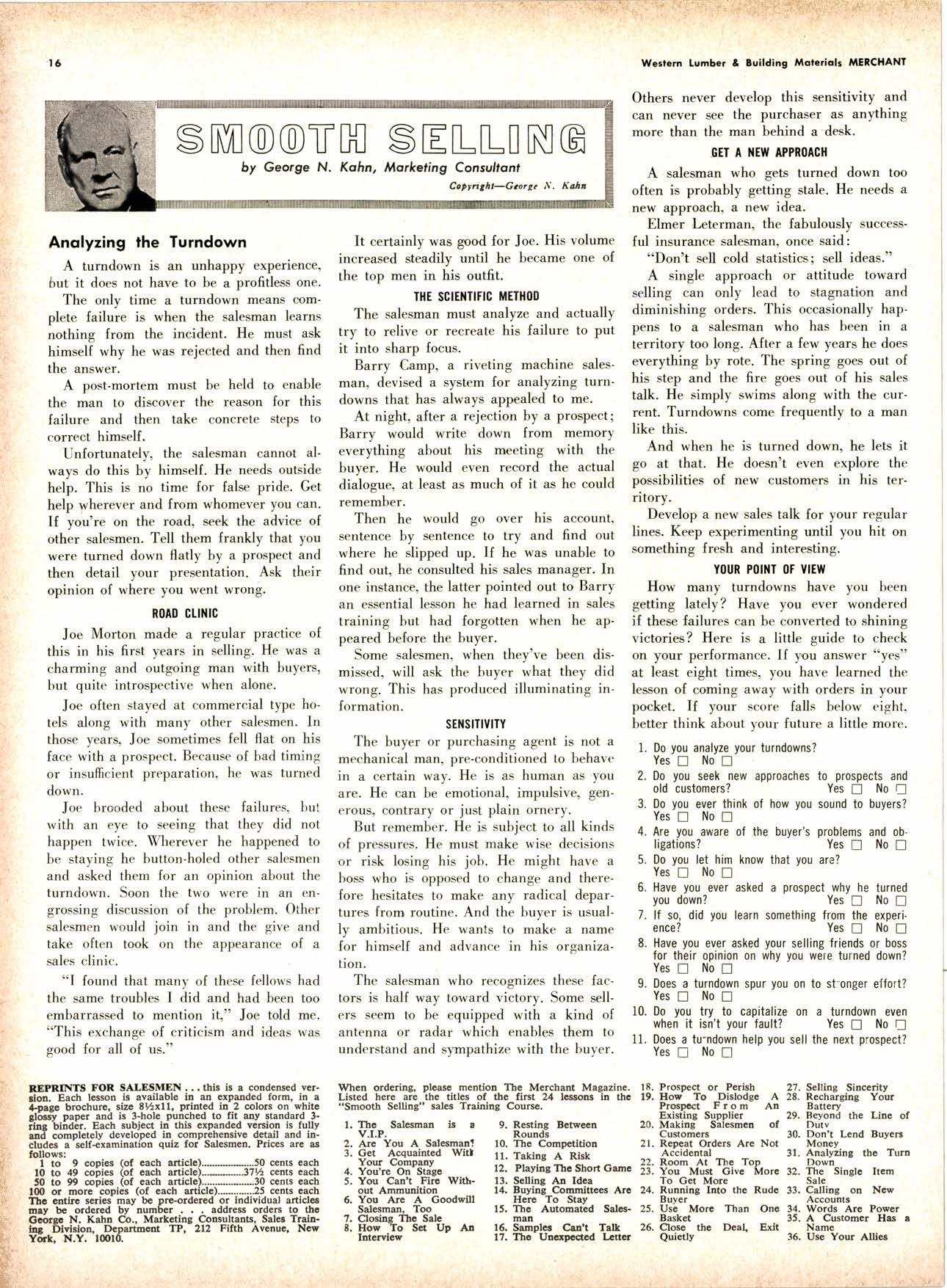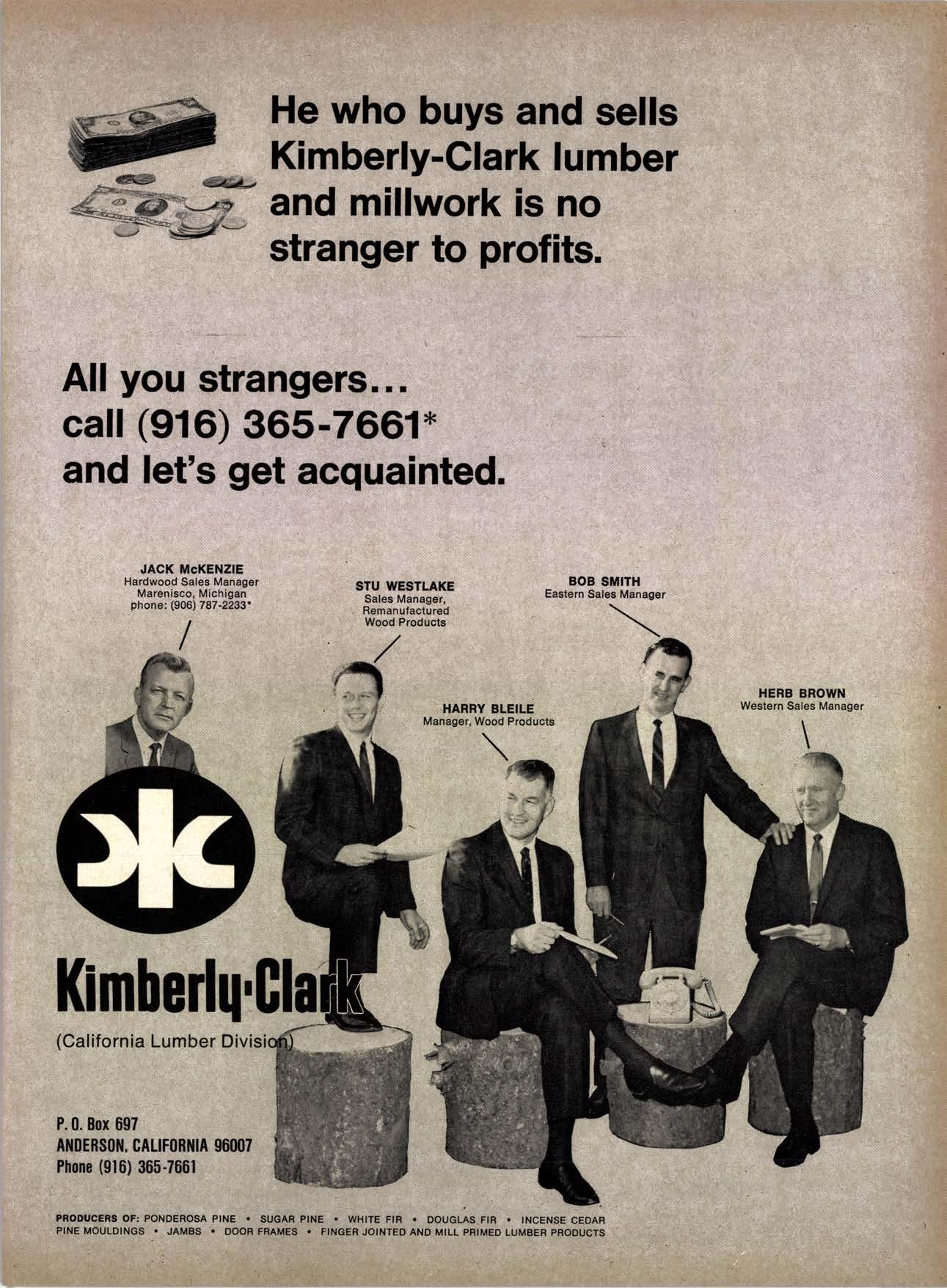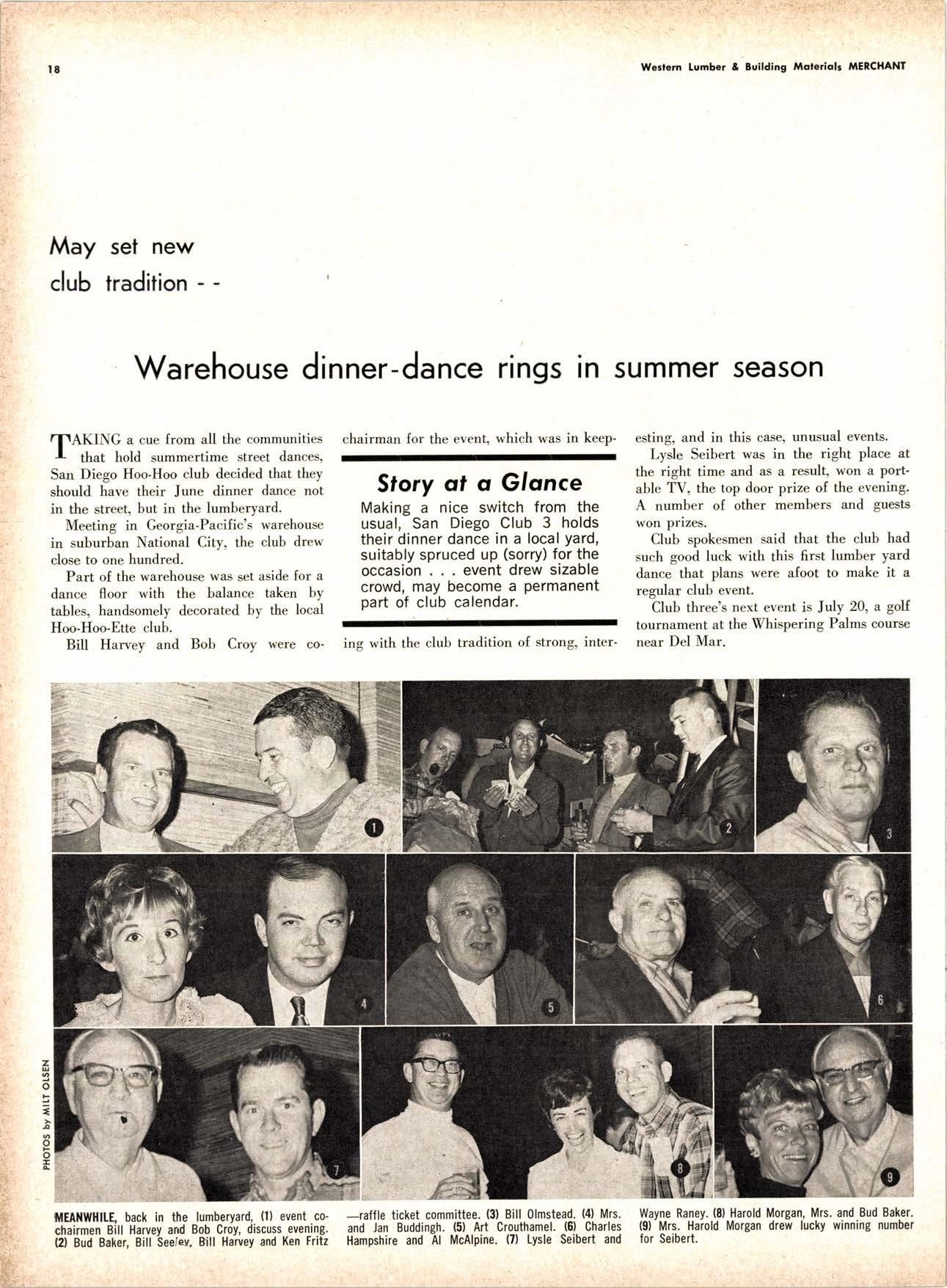
5 minute read
SMN@@TH SELtING
by George N. Kohn, Morketins
Anolyzing the Turndown
A turndown is an unhappy experience, but it does not have to be a profitless one.
The only time a turndown means complete failure is when the salesman learns nothing from the incident. He must ask himself why he was rejected and then find the answer.
A post-mortem must be held to enable the man to discover the reason for this failure and then take concrete steps to correct himself.
Unfortunately, the salesman cannot al' ways do this by himself. He needs outside help. This is no time for false pride. Get help wherever and from whomever you can. If you're on the road, seek the advice of other salesmen. Tell them frankly that you were turned down flatly by a prospect and then detail your presentation. Ask their opinion o[ where you went wrong.
RoAlt clllllc
Joe Morton made a regular practice of this in his first years in selling. He was a charming and outgoing man with buyers, but quite introspective when alone.
Joe often stayed at commercial type hotels along with many other salesmen. In those years, Joe sometimes fell flat on his face with a prospect. Because of bad timing or insufficient preparation, he was turned down.
Joe brooded about these failures, but with an eye to seeing that they did not happen twice. W'herever he happened to be staying he button-holed other salesmen and asked them for an opinion about the turndown. Soon the two were in an engrossing discussion of the problem. Other salesmen would join in and the give and take o{ten took on the appearance of a sales elinic.
"I found that many of these fellows had the same troubles I did and had been too embarrassed to mention it," Joe told me. "This exchange of criticism and ideas was good for all of us."
REPRINTS FOR SALESMEN this is a condenscd verdon. Bach lcsson is available in aD expanded form, in a 4oaro brochurc, size 8!6xll, printcd itr 2 colots on whito d6c* paper and is 3-hole puEched to fit aay standard 3. iinr btid&. Each subjcct in this cxpanded vcrsion is fullv gtral completely devcloped in comprehensivo detail and iocludes a-self+xamination quiz for Salesmcn. Prices arc as fotlows:
I to 9 copies (of each articlc).-.-.-*...50 ccnts each 10 to 49 cobies (of each article)...---...37r1 ccnts cach 50 to 99 cobies (of each article)......-....-......30 cents cach lm or morc coplcc (of each articlc)-............25 cents cach Thc GNrtlrc scrics may be Dr€rdercd or individual articlcr may be ordcred by numbcr addrcss ordcrs to tbo Ocorsc N. Kahn Co., Markcting Consultants, Salca Trdlr. hr Dlylrlo$ Dcpartdoot TP, 212 Fifth Avcnue, New York. N.Y. tmlo.
It certainly was good for Joe. His volume increased steadily until he became one of the top men in his outfit.
Ihe Scieiititic Tieihod
The salesman must analyze and actually try to relive or recreate his failure to put it into sharp focus.
Barry Camp, a riveting machine salesman, devised a system for analyzing turndowns that has always appealed to me.
At night, after a rejection by a prospect; Barry would write down from memory everything about his rneeting with the buyer. He would even rec\ord the actual dialogue, at least as much of it as he could remember.
Then he would go over his accounto sentence by sentence to try and find out where he slipped up. If he was unable to find out, he consulted his sales manager. In one instance, the latter pointed out to Barry an essential lesson he had learned in sales training but had forgotten when he appeared before the buyer.
Some salesmen, when they've been dismissed, will ask the buyer what they did wrong. This has produced illuminating in{ormation.
sEl{SrilVlil
The buyer or purchasing agent is not a mechanical man, pre-conditioned to behave in a certain way. He is as human as you are. He can be emotional, impulsivg generous, contrary or just plain ornery.
But remember. He is subject to all kinds of pressures. He must make wise decisions or risk losing his job. He might have a boss who is opposed to change and therefore hesitates to make any radical departures from routine. And the buyer is usually ambitious. He wants to make a name for himself and advance in his organization.
The salesman who recognizes these factors is half way toward victory. Some sellers seem to be equipped with a kind of antenna or radar which enables them to understand and sympathize with the buyer.
Others never develop this sensitivity and can never see the purchaser as anything more than the man behind a desk.
GET A I{EW APPN(IACII
A salesman who gets turned down too often is probably getting stale. He needs a new approach, a new idea.
Elmer Leterman, the fabulously successful insurance salesman, once said: ooDon't sell cold statistics; sell ideas."
A single approach or attitude toward selling can only lead to stagnation and diminishing orders. This occasionally happens to a salesman who has been in a territory too long. After a few years he does everything by rote. The spring goes out o{ his step and the fire goes out of his sales talk. He simply swims along with the current. Turndowns come frequently to a man like this.
And when he is turned down. he lets it go at that. He doesn't even explore the possibilities of new customers in his territory.
Develop a new sales talk for your regular lines. Keep experimenting until you hit on something fresh and interesting.
YOUR
P()II{I |)F VIEW
How many turndowns have you been getting lately? Have you ever wondered if these failures can be converted to shining victories? Here is a little guide to check on your performance. If you answer 'oyes" at least eight times, you have learned the lesson of coming away with orders in your pocket. If your score falls below eight, better think about your future a little more.
1. Do you analyze your turndowns? YesI Non
2. Do you seek new approaches to prospects and old customers? Yes ! No ll
3. Do you ever think of hoyv you sound to buyers? Yesn Notr
4. Are you aware of the buyer's problems and obligations? Yes n No fl
5. Do you let him know that you are? Yes! Nol
6. Have you ever asked a prmpect why he turned you down? Yesn Non
7. lf so, did you learn something from the experi. ence? Yes n No E
8. Have you ever asked your selling friends or boss for their opinion on why you were turned down? Yesn No!
9. Does a turndown spur you on to st:onger effort? YesI Non
10. Do you try to capitalize on a turndown even when it isn't your fault? Yes n No
11. Does a tu-ndown help you sell the next prospect? Yestr Non

May set new club tradition -Warehouse dinner-dance rings in summer season

T|AKING a cue from all the communities r that hold summertime street dances, San Diego Hoo-Hoo club decided that they should have their June dinner dance not in the street, but in the lumberyard' Meeting in Georgia-Pacific's warehouse in suburban National City, the club drew close to one hundred.
Part of the warehouse was set aside for a dance floor with the balance taken by tables, handsomely decorated by the local
Hoo-Hoo-Ette club.
Bill Harvey and Bob Croy were chairman for the evenl which was in keep-
Story d] d Gfonce
Making a nice switch from the usual, San Diego Club 3 holds their dinner dance in a local yard, suitably spruced up (sorry) for the occasion event drew sizable crowd, may become a permanent part of club calendar.
co- ing with the club tradition of strong inter- esting, and in this case, unusual events' Lysle Seibert was in the right place at the right time and as a result, won a port' able TV, the top door prize of the evening. A number of other members and guests won prizes.
Club spokesmen said that the club had such good luck with this first lumber yard dance that plans were afoot to make it a regular club event.
Club three's next event is July 20, a golf tournament at the W'hispering Palms course near Del Mar.
TIMBERLINE FOREST PRODUCTS, INC.











